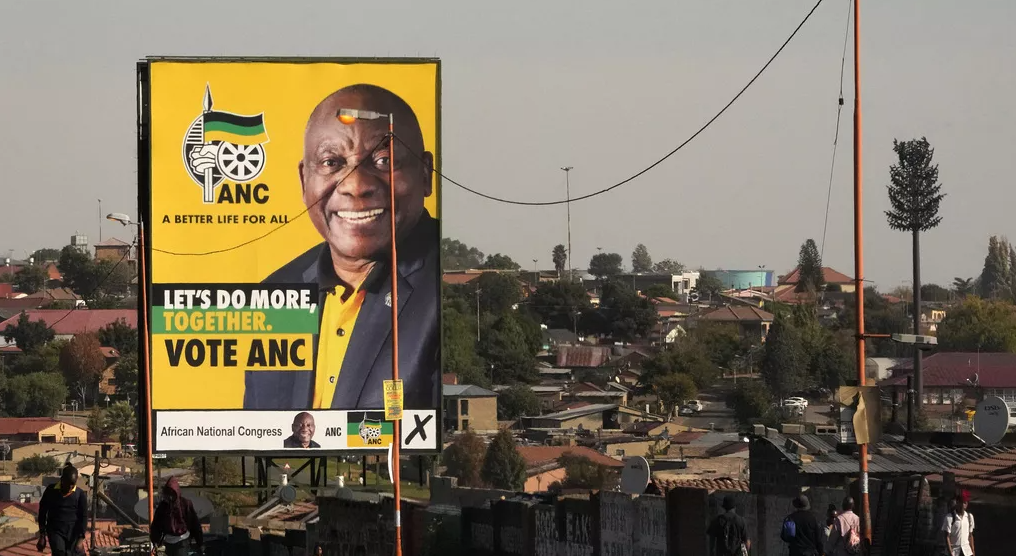South Africa Gears Up for Potentially: South Africa’s upcoming elections are a watershed point in the country’s history. After 30 years in power, the African National Congress (ANC) is facing its most difficult electoral test to date, as polls suggest it may lose its majority for the first time ever.
High unemployment, extensive poverty, and a series of corruption scandals have tarnished the ANC’s image, which was once held in high regard throughout the post-apartheid period. The African National Congress (ANC) is battling growing voter dissatisfaction as President Cyril Ramaphosa seeks reelection on May 29.
In an unprecedented development in South Africa’s political history, coalition politics will be thrust upon the ANC if it is unable to obtain a majority. This change has the potential to shake up policies in the country, which is often considered to have the most developed economy in Africa.
Voters in South Africa do not choose the president directly but rather their political party, which is subsequently given several parliamentary seats according to its vote percentage. The next step in determining a nation’s political course is the election of its head of state, which takes place after parliamentarians gather.
Looking at the major parties and individuals influencing the election is crucial as the country gets ready for what might be its most significant political shift since apartheid ended:
Cyril Ramaphosa, a rock-solid member of the African National Congress (ANC), was formerly idolized because of his status as Nelson Mandela’s protégé. Now, though, he is under scrutiny as president. Following Jacob Zuma’s departure in 2018 due to corruption charges, he returned to politics and quickly rose to the presidency after a stint in business.
Despite Ramaphosa’s best efforts, the fight against government corruption continues. Under his reign, the unemployment rate skyrocketed to 32%, poverty remained stubbornly high, and power outages occurred repeatedly, putting his administration under harsh criticism. Despite these obstacles, the ANC is still in a solid position to win the most votes, even if they may not reach 50%, and will have to form a coalition to ensure Ramaphosa’s reelection.
The Key Opposition Figure: The ANC’s hegemon in South Africa is John Steenhuisen, who heads the Democratic Alliance (DA). The Democratic Alliance (DA) presents itself as a moderate option and claims it can save South Africa from the current government’s corruption and incompetence. Though it has high hopes, the DA has only achieved moderate electoral success, with a significantly smaller vote share than the ANC.
Discussions about racial representation in politics have been sparked by Steenhuisen’s leadership, particularly because he is the only white leader among South Africa’s main political factions. Skeptics dispute the DA’s inclusivity and representation, claiming that the party’s primarily white leadership doesn’t connect with the country’s largely Black population.
A Marxist with a Tempest:
With the Economic Freedom Fighters (EFF) under his leadership, Julius Malema becomes an influential political figure in South Africa. The far-left EFF has quickly risen from its 2013 founding to become the third-largest party in Parliament. Malema has connected with disillusioned young and low-income areas through his passionate denunciation of the ANC’s alleged disregard for vulnerable groups.
Redistribution of land and nationalization of important sectors are central to the EFF’s agenda, which hits close to home in a society where racial economic inequality is firmly entrenched. The party’s violent stance and frequent disruptions of Parliament have garnered praise and criticism, making it difficult to see it as a reliable coalition partner beyond the elections.
In the Wake of Zuma’s Return:
Ex-President Jacob Zuma’s return to politics adds uncertainty to a chaotic election season. Zuma’s symbolic break from the ANC and subsequent formation of the MK Party further divided the political spectrum. The three leading candidates are unlikely to be challenged directly, but Zuma’s lasting impact, especially in KwaZulu-Natal, his home region, could affect the election results.
But Zuma’s involvement in recent civil upheaval and court challenges show how shaky his political comeback is, so it’s not without controversy. Unrest and instability could derail the election process due to the continuing disagreements regarding his eligibility to run for Parliament.
The forthcoming elections in South Africa mark a turning point in the country’s democratic history. The African National Congress (ANC) confronts formidable challenges to its decades-long dominance. As voters consider a wide range of political platforms, the results will have far-reaching consequences, influencing South Africa’s political climate for years.


















